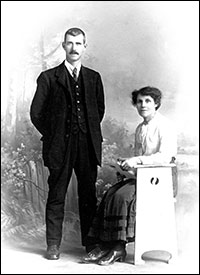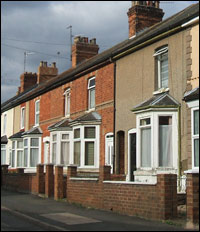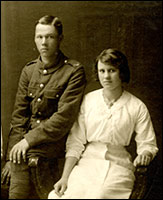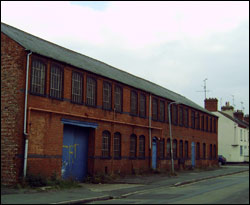|
|||||||||||||||||
| As told to her son Paul Roberts |
|||||||||||||||||
|
Doris Roberts (nee Watts)
|
|||||||||||||||||
Yet as the eldest girl who had to take care of the last born baby when there was a new arrival I was concerned as I grew up. When the eighth baby arrived I ask Mother if there would be any more and mother replied "I hope not dear". Yet another eight arrived. I think that it was my generation that began to question women's role and to want women to have a better life than household drudgery and to be totally submissive to men. I think that this is what Mother wanted but she belonged to the old ways and had to put up with these things without question. When mother had another baby we older children would be sleeping upstairs. Three of us in the one bed with the sixteen months old baby, the last one born, sleeping at the foot of our bed. I can remember one birth occurring whilst Father was in hospital having an operation for his varicose veins. Mrs. Darnell a neighbour had to cook our dinner, which was "bake-tators"*. Mother sat up in bed with the new baby and cut and dished us out our dinners. There were four children then so it would be about 1905 time. Also women then did not get up until ten days after a pregnancy. So good neighbours were essential. Mrs. Darnell was always a good friend to Mother a sympathetic ear, help when needed and discrete. [*Baked potatoes - cooked in their skins or 'jackets'] Father's "Problem" Father in those early days was a heavy 'drinker'. This was the principle cause of all our troubles. Women accepted men's faults in those days without question. He was a handsewn man and as such he earned good money because he was a very skilled craft. One often speculates whether the cause was marriage at an early age and the responsibility of having a large family - was 'drink' his escape? .
Mother was a 'boot finisher' and I can see her now in my minds eye in that little back room of our house in Cromwell Road finishing a boot that was strapped on one knee and with the other foot tapping the cradle that had a baby in it. It was a wicker cradle on rockers. Women in those days with boots and babies all in one small house had a very hard time. It was drudgery. Good money came into the house, but Father 'drank' it away. Later as I grew older I realised that whilst other men also 'drank' they first paid over their board to their wives, whereas Father paid his board with what he had left after he had been out drinking. That was the difference between other people and us.
Yet with Tom's death Father changed and abandoned his dreadful habit. So that the younger members of the family see things differently than we older ones did. Was Father jealous of Tom? Certainly Mother relied on Tom. Yet Mother also relied on me but I could talk to Father and tell him my troubles. Tom couldn't. Did Tom see the problems from Mothers side? Tom was her favourite and she never got over his death in France. Perhaps suppressing any arguments in the Family covered up issues? He strongly condemned women who took snuff. Snuff taking was a common habit amongst shoemakers in those times. A drunken woman disgusted him. He was very conservative In his outlook. Father as a Father I can recall one evening coming home from a visit to the newly opened Palace when in the dark a man offered me a bar of chocolate if I would go into the field with him. Between Kings Road and Cromwell Road in those days was a field. I ran into Kings Road and across the field into our house by the gate at the bottom of our garden which then lead into that field. I told my parents about the man. Father dashed out into the street looking for this person taking a hammer with him. Mother asked me if I knew who the man was and I told her whom I thought it to be. She begged me not to reveal it to father unless I was absolutely sure. Mother was frightened at Father's response were he ever to know that man's name. Father also was very angry with me for coming across the field instead of keeping to the street. He never beat us children or took a strap to us as some children's fathers did but he was a very strict and protective Father. As I got older I was allowed out on Sunday Evenings until 9pm. On the first occasion I was coming down our entry as the Church Clock struck nine. He clipped my ear for being five minutes late. I complained that the clock on the mantle shelf was fast, which it was, but it made no difference to Father. I had to be in at his nine o'clock. On another occasion I was with friends in the High Street when a voice said "Goodnight Doll". I was with some other girls and we were talking to some boys. I was so embarrassed. It was father in the shadows the other side of the road keeping an eye on us. We could play in the streets but not allowed to shout and scream. One had to play decorously. Early Days In the early days, about 1900, when there was only three of us children Tom, Myself and Elsie. We would be taken for an evening walk. From the path opposite our house in Cromwell Road we would go past the Cricket Ground, through the Allotments over the style and across the fields where we would come out in Higham Ferrers. Then down Wharf Lane to the Inn that stood there in those days. Father would have a 'pint' and we children a bottle of 'Spruce' each. Then we would all walk back to Cromwell Road. Whilst I have memories of hard times I never forget my pleasant memories. How pleasant were those Sunday evening walks to the Wharf Inn. In the autumn we would go up the path and into Denton's fields and collect grasses for Mother to dry and place in the ornaments in the front room for winter decoration. One of those fields was a mass of wild flowers. We would always bring Mother a bunch of those flowers when we went into those fields. We liked to collect the first May blossom and take home to Mother. It was not allowed in the house but had to stand outside the back door in a jam jar. Father was a very active man. Always out and about, up and doing. He had an allotment and he would grow all our vegetables and potatoes. Often he would go up the fields for a walk. I recall on one occasion he brought home to Mother four big cowslips. We children were excited but he refused to hand them to us saying that they were especially for Mother. Some years ago I developed cataracts on my eyes and for a number of years had very bad vision. Kettering Hospital removed them. Shortly after the operation we went down to Cornwall for the holiday where wild flowers still grow profusely in the hedgerows. That year I saw all of nature's colours once more for the first time for many years. It took my mind back to those early days when wild flowers grew profusely all round Rushden and one could take home to ones Mother a bunch of Bull daisies. In January men would come round with their faces blackened collecting a penny for the 'Poor Ploughboy'. The old custom was still carried out. But when they knocked on the door I would hide behind Mother's skirts because they frightened me. That would be before the turn of this century. On 'Oak Apple Day' we always carried a sprig of Oak on our dress otherwise another child with a stinging nettle would sting you. A tree in one of Denton's fields had a lovely big oak tree that grew very lovely sprigs for Oak apple Day *.
Between the wall of Chapman's Box Factory In Cromwell Road and the pavement was a strip of concrete. Older girls would teach we younger ones to dance. Here I learnt the "two-step". Later I would show the younger girls to dance. In the dry weather would come "Button Time". We would make a ring about 12 inches across. From a bag of buttons we would throw a button and the nearest to this first button was the winner of all the other thrown buttons. Lavendon & Olney My Father had been born at Lavendon. His oldest Sister Polly lived at Olney. We walked to either Lavendon or Olney in those days taking the path through the fields from the end of Glassbrook Road. This would bring us out in Irchester and then it would be by road through Wollaston to Grandmother Watts at Lavendon. Grandfather Watts died when I was very young. It was before my sister Elsie was born so it would be about the last year of the old century. On this, the only occasion that I saw, him he was being pushed in a wicker Bath Chair by Grandmother. He, himself, was a small man. For this visit Tom had on his sailor suit which was very fashionable for boys then. On this occasion we travelled to Lavendon and back to Rushden by the waggonette. Aunt Poll's House was in the back street near the Convent. It was here that I saw my first Nun. My cousin would embroider handkerchiefs for the Nuns to sell. At the bottom of the garden was a well. In dry weather water would be in short supply. Aunt Polly was very sparse dishing out water she saved every drop. With my Cousin we would often visit "Cowpers Oak". I remember the first occasion that I saw this famous oak. I just had to climb this lovely tree. When I came to climb down to my horror some boys sat below eating their tea unaware of me up aloft. In those days our dresses came down to our ankles so I could not climb down without revealing my underwear. These were pantaloons, which buttoned above the knee. In summer we wore pantaloons which had an embroidered frill round the knee but one never showed this. To allow boys to see ones underwear was unthinkable. There was no way to come down from "Cowpers Oak" until the boys' left I just had to sit it out. After the boys left I climbed down and we all ate our tea. On the way back to Aunt Poll's house I accidentally broke her umbrella. Even now I can her Aunt Poll sigh "Oh dear Doris' Altogether it was a day of misfortune I went to bed that night in disgrace. I think that Aunt Polly was glad when the holiday was over. At Olney with Aunt Polly and Uncle George Tompkins my cousin and myself we would walk on Sundays to Weston Underwood. I always remember those nice walks and that beautiful view of the river. On Sunday evenings with my Cousin we would go to Church for the evening service. One of Aunt Polly's neighbours was a very elderly lady with jet-black hair still worn in ringlets, which even then were considered old fashioned. Grandmother Watts at Lavendon was a lace maker. She always wore the old-fashioned lace cap. She wore on her dress lace cuffs and a lace jabot. On a side table was a book for visitors to sign. All her Granddaughters received a lace handkerchief, which she herself made when they were twenty-one years old. Unfortunately when I was twenty-one she was too old to make me a lace handkerchief. The last time that I saw her was at Aunt Alice's (White) house at Bozeat, this was in the early 1920's. I went to her funeral and remembered that we all walked in procession behind the Coffin to the cemetery Lavendon; it was like another world compared to Rushden.
|
|||||||||||||||||
|
Paul Roberts
|
|||||||||||||||||



